BY MIKEL WEISSER
There’s an old phrase popular in AZ’s rough and tumble cannabis industry: “Pioneers get slaughtered, Settlers Thrive.” It’s a way of saying those who break new ground, usually get chewed up in the process and the second wave of entrepreneurs succeed from the earlier group’s mistakes.
Luckily for Desert Valley Testing and Delta Verde Labs, their pioneering forays as two of Arizona’s first high-profile testing companies are still phenomenal successes.

Desert Valley Testing
51 W Weldon Ave, Phoenix, AZ 85013, (480) 788-6644
https://www.desertvalleytesting.com/
Ten years ago, Tabitha Hauer woke up one morning to find she’d gone blind in her left eye. It took two years before doctors diagnosed her with iridocorneal endothelial syndrome (ICE), a unique ophthalmic disorder involving an irregular corneal endothelium that can lead to corneal edema (swelling), atrophy and, ultimately, blindness.
Hauer first turned to traditional medicine to solve the problem. But, after multiple surgeries and the loss of vision in her left eye, Hauer still found no relief from extreme pain and pressure. Her doctor recommended she consider medical marijuana. Tabitha obtained her patient card and began researching strains to get relief from her ailments.
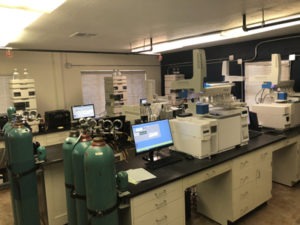
“Every Patient Needs to Know What Is in Their Medical Marijuana”
Before long Hauer identified that the cannabinoid, Cannabigerol (CBG), is associated with reducing ocular pressure. After visiting many dispensaries searching for strains high in CBG, Hauer realized much of medical marijuana sold in Arizona was not being tested. So, an already accomplished organic chemist, Hauer decided to get her own equipment and start testing medical marijuana herself.
“Every patient needs to know what is in their medical marijuana to choose the appropriate strain that will give them the most benefit,” Hauer said afterward, explaining her life changing decision. She purchased her own HPLC equipment and created her own testing methods. By November of 2014, Hauer launched Desert Valley Testing, making them the oldest operating cannabis lab in the state.
Almost immediately, Hauer recruited management wiz Erin Newcomb to run the office. If you have considered cannabis testing in AZ, chances are you’ve met Erin Newcomb. Friendly, energetic and elaborately tattooed, Erin serves as the go-to contact for Desert Valley Testing and directs their daily operations.
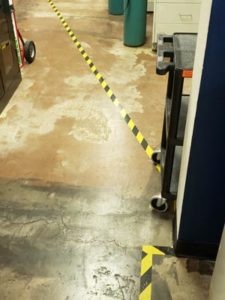
Old School Industrial
After spending years in the fragrant facilities of a south Phoenix medical grow, DVT moved into Phoenix’s “Central Avenue Corridor,” less than a block from the hipster coffee shops of uptown Central Avenue.
One difference this lab boasts is its all female leadership. From Owner to Chemist, DVT employs 90% women, a rarity in an industry dominated by men. It is also compact and “old school”, the austerity and efficiency from a time before “industrial” was even an intentional style. Painted stucco walls, stark laboratory workbenches, stainless steel tables and shelves and, most strikingly, safety tape stripes along the bare concrete floors make this lab feel different from every other. Newcomb knows that for patients and brand-new cultivators, going to a testing facility can be intimidating. “We want to make people feel comfortable and confident in our results.”
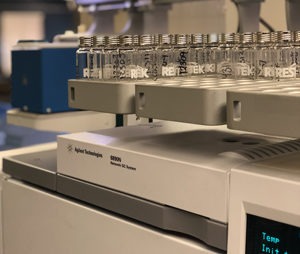
Industry Testing Priorities Are Changing.
Newcomb has seen a dramatic change over the years in what customers are looking for. “At first it was strictly potency. But as the industry has grown and patients have educated themselves, industry testing priorities are changing. These days about 50% of the tests we run are for health and safety.”
“DVT intends to continue our support for both the industry and the patients by sharing our knowledge to educate others,” Newcomb says. Over the years Desert Valley Testing has printed and distributed tens of thousands of education cards on cannabinoids and terpenes.
Through it all, Newcomb stresses, DVT remains focused on improving Arizona cannabis for both the industry and the patients. “DVT is not investor owned,” Newcomb points out. “It was established by a patient for patients.” They offer laboratory tours to review all their processes and services. DVT offers free services to all medicating children and terminally ill patients. “We’ve even named some of our instrumentation after some of the first patients we were able to help. Most memorably, ‘Myranda’ our HPLC ” she adds.
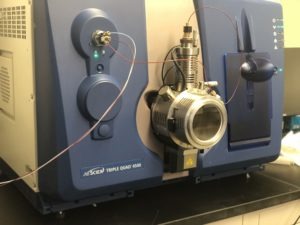
500 tests a day
Their Laboratory Manager/Chemist, Erin Polly, moved here from Seattle. Prior to that she worked in big pharma in Alabama for more than 10 yrs. Polly acquired her cannabis analysis knowledge in Washington’s bustling legal cannabis market.
Although they are open to the public Monday through Friday, DVT employs 13 staff members working 7 days a week to process data. “We run 200, to as many as 500, tests a day.” Most of the samples coming directly from grow sites, and only ten percent from patients/individual submissions.
An interesting market niche that DVT services are “white label companies.” Those are processors who create generic cannabis products for other brands to label.
Despite handling the biggest volume of testing in the state, DVT prides itself on its quality, more than its quantity, earning Emerald Scientific proficiency badges in all the testing services they offer with ISO certification in the works.
Over the years, they’ve doubled the number of compounds they test for as well as the instrumentation. In 2018, they rolled out a 60 compound pesticide analysis, joining Delta Verde as the first labs in the state to analyze pesticides using triple quad equipment.
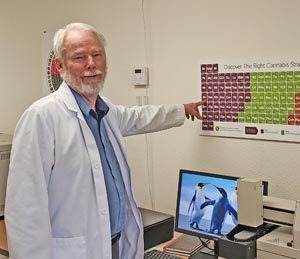
Delta Verde Labs
12620 Cave Creek Road #1A, Phoenix, AZ 85022, 602) 466-9730
https://www.deltaverdelaboratory.com/
“What’s the weirdest thing we’ve ever tested?” Jim Clark laughs and kicks back at his desk in his office at Delta Verde Labs. “There is no end to the types of things people try to put THC or CBD into.” He stops and laughs again at the question. “But we try to test it all.”
Conveniently located right next door to MUV Dispensary, Delta Verde is one of the older labs in the state. Clark and his original business partner, Mike Smalls started the company in 2015, the same month as Desert Valley Testing. Clark had recently retired from working in the DHS laboratories and was working with Smalls in the semi-conductor field when they hit on the idea of launching their testing company. They filed in 2014.
Clark won’t say how many samples Delta Verde runs in a given month or week but acknowledges that neither he nor his four-man crew get much down time. He won’t get a DA card and associate his labs with a dispensary because he values the independence it gives him. Because DHS regulated growers can only transfer to patients, some of his staff are patients, but in Jim’s lab not all the scientists have to be patients. “You shouldn’t have to be a patient just to do science.”
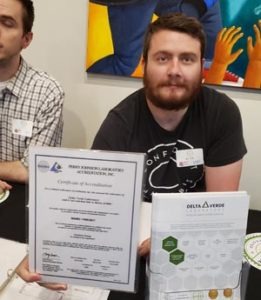
ISO
One of Jim’s proudest accomplishments is his company’s recent ISO certification. ISO-17025 is the international scientific lab gold standard. In addition to impeccable methodology and continuing professional education, cannabis lab ISO certification. Jim is doing his best to push Delta Verde to be the first and only ISO certified cannabis lab in the state.
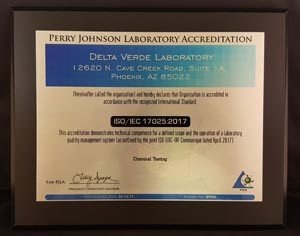
Potency and terpene profiles are the bread and butter of Clark’s lab. Delta Verde tests for seven cannabinoids and eighteen terpenes. CBD product manufacturers and white labelers make up a significant segment of the business. Thanks to the lab’s work in hemp testing from around the country, Jim has already dealt with postal inspectors wondering about the some of the smelly packages sent his way.
Delta Verde uses 3M Petrifilm, instead of petri dishes, for the microbiology testing. It’s sparked an interest in Jim. He would like to work with a grower who is having a problem and help test the effects of remediation. There are various technologies that could solve the pesticide dilemma some growers face, but each has its own potential problems.
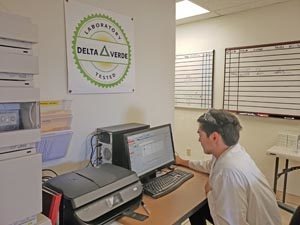
R&D
If growers use pesticides, they are literally spraying poisons directly on the plant material patients will consume. The popular brand Eagle 20 contains myclobutanil, which has been linked to respiratory disease, neurodegenerative disease, diabetes, birth defects, fertility and reproductive problems. And Eagle 20 is just one of dozens of pesticides banned in states with testing programs. Some forms of pesticides can concentrate as much as 200X during certain types of extraction.
Some growers attempt to eliminate pesticides entirely with integrated pest management (IPM) approaches that use beneficial microbes and insects to ward off harmful ones, but that approach risks failing microbial types.
This challenge happens to be one area Clark hopes his lab can develop R&D testing for remediation of contaminated crops, particularly mold and powdery mildew (PM). For the most part cannabis contaminated with pesticides, mold, mildew or most common bacterial contaminants can’t be sold to patients as is. Plants contaminated with salmonella or e. coli are considered irremediable under any circumstances.
However, using flash chromatography, pure THC or CBD can be extracted, leaving all other components behind. Radar wave or microwave sterilization also shows potential. Clark hopes someday he will work with growers to do “before and after” testing to finetune their remediation approaches. As acceptance of testing sinks in, Clark believes growers will want to innovate and learn to reduce their losses due to contaminated products.
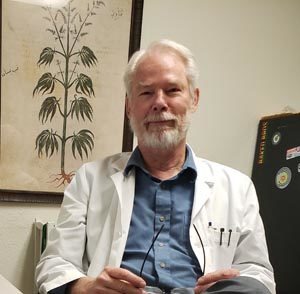
“DHS has not been a friend for patients.”
Watching this year’s battles over the testing bill, after watching last year’s failed testing bill, SB1420, Clark’s a bit exasperated. “I’m not even saying we need to have mandated testing. Just allow us to do it.” Then Clark leans forward with sudden seriousness. “DHS has not been a friend for patients or for safety for medical marijuana in the state of Arizona. Don’t get me wrong. There’s a lot of great employees at DHS, just not in the MMJ program.”
Jim would welcome reasonable oversight and thinks he knows why Arizona was the last state in the nation to test its cannabis. “Native Arizonans always do things a little different. It doesn’t matter how they do it in other states, we think we have to work it out for ourselves. So, we’re still working on it.”
See Also:
Part One: The Long Road to Safety
Part Two: Basic Primer on Testing and its Many Incomprehensible Terms
Stay Tuned for Part Four, The Reformers (C4 and Level One Labs).


